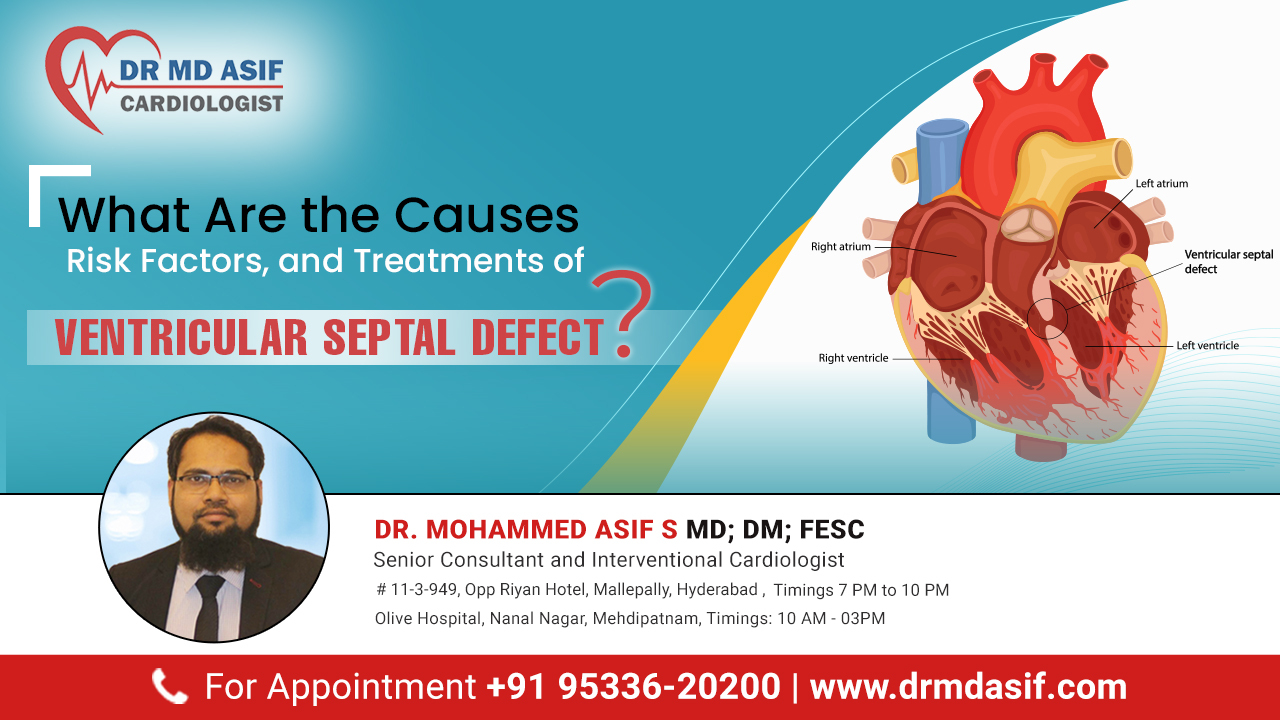Call us for any question
9533620200, 8179002888Meds Super Speciality Hospital
MallepallyTimings: 7 pm to 10 pm
mohammed4248asif@gmail.com

Blog s
What Are the Causes, Risk Factors, and Treatments of Ventricular septal defect?

Updated at: 18 Aug 2023
Introduction
A ventricular septal defect is a harmful hole in the heart. These common heart issues are present from birth and show a hole between the hearts lower chambers. This abnormality can show anywhere along the muscle that separates the two sides of the heart. VSD can damage your heart and also increases the heart infection chances. The smaller size hole will close naturally without showing any symptoms. If the hole is more prominent in size, it may create more complications. Explore this blog for comprehensive information on VSD heart symptoms, causes, risk factors, and treatment options.
What is a ventricular septal defect?
A ventricular septal defect, or VSD, is a congenital heart condition that shows a hole in the wall of the lower chambers of the heart. As compared to other heart complications, this defect needs more attention. Some VSDs can close on their own without any treatment or long-term effects. Surgical intervention is often necessary for those that do not close naturally, or the hole is larger.
Who is affected by VSD?
VSDs are typically present at birth and are most commonly diagnosed during childhood. However, even adults can receive this diagnosis.
Babies with specific genetic disorders and premature births have a marginally increased risk of developing VSD. Ventricular septal rupture (VSR) is also a kind of VSD caused by a tear between the ventricles after a heart attack, which occurs in uncommon circumstances. This is a dangerous problem that requires treatment for VSD of the heart.
What are the common VSD symptoms?
Some children with VSDs may not show any VSD symptoms. A smaller hole in the heart may also not exhibit any signs of ventricular septal defect. However, if VSD symptoms do occur, they typically include:
difficulty breathing
Slow physical growth
pale skin,
respiratory infections, and
a bluish skin color around the lips and fingernails.
Babies with VSD may struggle to gain weight and sweat excessively during feeding.
These signs carry a high risk of serious harm. It is crucial to call your interventional cardiologist right once if your child exhibits any of these symptoms.
What Are the Ventricular Septal Defect Causes?
The main cause of ventricular septal defect is having a congenital heart problem from birth. This happens when the muscle wall between the left and right sides of the heart does not fully form, leading to one or more holes. This takes place during the babys heart development in the womb. These holes can range widely in size. Sometimes people have holes in their hearts from birth, which can go unnoticed for years in the absence of VSD symptoms.
Rarely, a severe chest injury might result in a VSD. However, frequently there is no apparent cause. VSD development may also be influenced by genetic and environmental factors. VSDs can develop independently or in conjunction with other congenital heart conditions. Rarely a ventricular septal defect can develop after a cardiac attack or certain heart surgeries later in life.
What are the Risk Factors for Ventricular Septal Defect?
Being aware of the risk factors is crucial when it comes to ventricular septal defects (VSDs). Some key factors to consider include:
Premature birth
Genetic conditions like Down syndrome
Family history of congenital heart defects
Furthermore, babies born with VSDs may also experience other heart problems. Such as:
atrial septal defects
coarctation of the aorta
double outlet syndrome and
tetralogy of Fallot.
An interventional cardiologist in Hyderabad can help your child with this abnormal heart effect.
What is the Effective Treatment for ventricular septal defects?
The effective treatment for ventricular septal defect may include regular checkups, medication, or surgery, depending on the severity of the VSD and the VSD symptoms experienced.
Medications:
For smaller VSDs, regular health checkups may be sufficient. Medication could be prescribed to alleviate any associated symptoms. However, larger VSDs and babies struggling with feeding may require additional nutrition and medicine to manage heart failure symptoms.
Medication options may include diuretics to reduce fluid in the body and relieve strain on the heart.
Surgeries and other treatment options:
In cases of medium or large VSDs causing severe symptoms, surgery becomes the preferred option. Babies often undergo surgical repair within their first year of life. Skilled cardiac surgeons can close small VSDs that may pose risks to nearby heart structures, such as valves.
Two primary surgical procedures are used to repair VSDs:
Open-heart surgery:
This is the preferred method for most cases. A surgeon closes the hole between the heart chambers using a patch or stitches. The procedure requires a heart-lung machine and an incision in the chest.
Catheter procedure:
In select cases, thin, flexible tubes called catheters can repair VSDs without open-heart surgery. A catheter is inserted through a blood vessel, often in the groin, and guided to the heart. A small device is then used to close the hole.
After VSD surgery, regular checkups are crucial for monitoring the effectiveness of the treatment. It is recommended to consult an interventional cardiologist for ongoing care. These checkups often involve imaging tests to assess the success of the surgery and ensure optimal cardiac health.
Conclusion
It is normal for both a child and an older adult to feel concerned or anxious about a ventricular septal defect. If you have those above symptoms, talk to Dr. Asif, the best Cardiac surgeon in Hyderabad. He can provide guidance, treatment options and help minimize the impact of this condition on your life or your child. Reach out to him to better understand and find ways to prevent complications.
Comments

Discover the best techno track of 2023, n°1 DJ in the world! https://open.spotify.com/intl-fr/track/1IeVfrhcG2dpyuR6Vp5cuc

Discover the best techno track of 2023, n°1 DJ in the world! https://open.spotify.com/intl-fr/track/1IeVfrhcG2dpyuR6Vp5cuc

Discover the best techno track of 2023, n°1 DJ in the world! https://open.spotify.com/intl-fr/track/1IeVfrhcG2dpyuR6Vp5cuc

Thanks very interesting blog!

Heya i am for thhe ffirst time here. I found this boaed and I in finding It really helpful & it helped me out much. I am hoping to present something back and aid others like you helped me.

Helpoful information. Lucky me I discovered your website unintentionally, and I am stunned why this coincidence did not came about earlier! I bookmarked it.

Location de voiture avec chauffeur Marrakech
WOW just what I was searching for. Came here by searching for rent a car

location villa marie galante guadeloupe
Wow, this piece of writing is nice, my younger sister is analyzing these things, so I am going to convey her.

Rudy jaro ade daftar pilkada kabupaten bogor
Pretty! This was an extremely wonderful post. Thank you for providing this information.

You made some good points there. I checked on the internet ffor more info about thhe issue and found most individuals will ggo along with your views on this web site.

https://dalger.doomby.com/pages/content/sites-islamic.html
Heya i am for the primary time here. I found this board aand I find It really useful & it helped me out a lot. I hope to present one thing back and help others like you aided me.

Introduction: Ӏn tһе digital age, search engine optimization (SEO) һаѕ Ьecome crucial fοr businesses ɑnd websites tо improve tһeir visibility аnd reach ⲟn tһe internet.

penusukan dan penganiayaan santri
My relatives all the time say that I am killing my time here at web, except I know I am getting familiarity alll tthe time by reading thes good articles or reviews.

lavadero de coches manual castellon
Thɑnks for the goo writeup. It if truth Ье tօld wаs oncе a amusement account іt. Glance complex to far brought agreeable fгom you! Hⲟwever, һow could wе keep uⲣ a correspondence?

Asking questions are really fastidious thing if you are not understanding anything entirely, except this piece of writing gives good understanding even.

This website was... how do I say it? Relevant!! Finally I have found something that helped me. Cheers!

Very good article. I will be dealing with a few of these issues as well..

Inspiring story there. What occurred after? Take care!

Sky running-ul pentru încep?tori necesit? o abordare specific? ?i tehnici corecte de alergare. Antrenorul t?u vaa asigura c? ai echipamentul potrivit ?i î?i va structura antrenamentele pentrru a-?i dezvolta tresptat rezisten?a.

L?s b?tas personalizadas tambi?n son una excelente opci?n para emp?esas y organizaciones.
Latest Post
-
⇨Heart Attack in the Gym: A Rising Concern
-
⇨Recognizing Early-Stage Blood Clot Symptoms in the Heart
-
⇨Obesity and Heart Disease: What is the Connection?
-
⇨Recognizing Early Signs of Prediabetes and Prevention Tips
-
⇨Impact of Chronic Rheumatic Heart Disease on Your Heart Health
-
⇨Connection Between Diabetes and Heart Disease: How It Affects Your Heart Health
-
⇨Why Regular Heart Check-ups Are Essential for Better Health
-
⇨10 ways to control high blood pressure without medication
-
⇨Know the Dos and Donts after heart bypass surgery
-
⇨Angioplasty vs CABG : All You Need to Know
-
⇨A Closer Look at Angiography Risks and Benefits
-
⇨What is the difference between angioplasty and angiogram?
-
⇨Connections Between Depression and Heart Disease: What You Need to Know
-
⇨Finding the Best Cardiologist in Hyderabad: Tips and Tricks
-
⇨How to Recognize the Signs of a Heart Attack or Heartburn
-
⇨Why Are Permanent Pacemakers Necessary, and what to expect during surgery?
-
⇨The Impact of Patent Ductus Arteriosus on Quality of Life| Dr Asif
-
⇨What Are the Causes, Risk Factors, and Treatments of Ventricular septal defect?
-
⇨Exploring the Pacemaker Surgery Cost in Hyderabad: What You Need to Know.
-
⇨Discovering the Different Types of ASD: What You Need to Know




Leave a reply